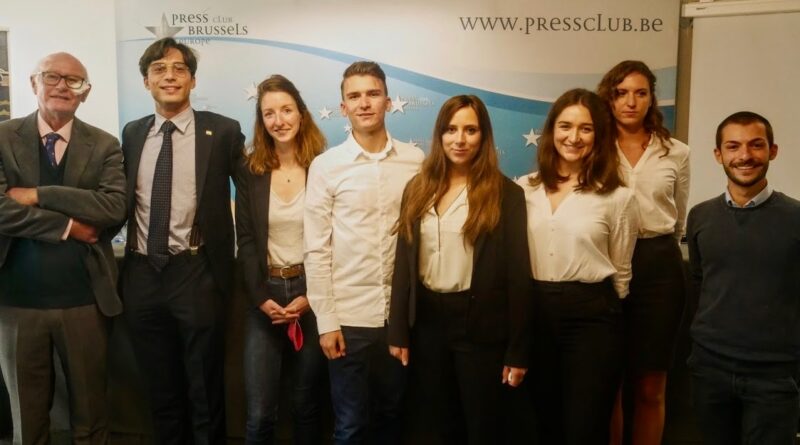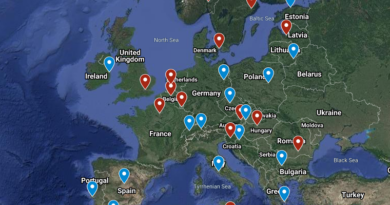Campaigners launch one million signatures initiative for voting rights of EU citizens
Sinéad completed her law degree in Dublin. Anna studied languages in Italy and European affairs in Germany. They now share an office in Brussels, from where they have orchestrated a campaign calling for full voting rights for EU citizens moving to another EU country.
Launched on Tuesday, the European Citizens’ Initiative Voters Without Borders is an EU-wide petition asking that EU citizens who move to another EU state acquire the automatic right to vote and stand as candidates in regional and national elections, including referendums. At present, they can vote and stand as candidates only in local and European elections.
For the European Commission to respond, one million signatures have to be collected in a year from a minimum of seven EU states.
“Not a true EU citizenship“
Sinéad O’Keeffe and Anna Comacchio are part of a task force of 17 Erasmus students working with ECIT, the foundation on EU citizenship which is behind the push. The initiative is supported by some 50 other groups, including The Good Lobby, Democracy International, New Europeans, the European Students’ Forum (AEGEE), and the European Students’ Union.
“My uncle has been living in Germany for 10 years and yet, he cannot vote there nor in any election in Ireland,” Sinéad O’Keeffe told Europe Street (Ireland’s electoral register is based on residence).
As a student in Leipzig, Anna Comacchio tried to register to vote and had to insist it was her right to do so. “Outside big cities where many Europeans live, few EU citizens seek registration and local administrations are not always familiar with the procedures,” she said.
Several EU directives support the free movement and non-discrimination of EU citizens moving across the EU, but it is those on political rights that are working “least well,” campaigners argue. EU citizens are “discriminated against when it comes to having a political say,” according to a briefing by the ECIT Foundation.
Despite current rules, EU citizens living in other EU countries are often deterred from voting in municipal and European elections due to administrative hurdles and lack of information. As a result, only 10% voted in the country of residence and 20% in the country of origin in the 2019 European elections.
In addition, they are excluded from the “fundamental choices” being made in regional and national elections, campaigners argue.
The most glaring example was the Brexit referendum, when 3.7 millions EU citizens living in the UK (except for Maltese and Cypriots, who are part of the Commonwealth) were not allowed to vote.
It is also estimated that 60% of the 1.2 million British citizens living in the EU could not cast their vote, having lost their political rights under UK law because they had lived abroad for more than 15 years.
Several other countries in the EU do not allow their citizens abroad to participate in national elections, leaving them with no voting rights at all.
“With such partial rights we don’t have a true EU citizenship, since political rights are the gold standard of citizenship at any level,” Tony Venables, Founder of the ECIT Foundation, told Europe Street.
“Removing a stain” on European democracy
Some 14 million EU citizens live in EU member states other than their own, according to the EU statistical office Eurostat. If they were a country, the organisers of the initiative note, they would be the 8th largest in the bloc.
As a proportion of the total population, Luxembourg is the country that hosts most other EU citizens (40% of the population), followed by Cyprus (13%), Ireland and Malta (9%), Belgium and Austria (8%), and Germany (5%). Elsewhere, ‘mobile EU citizens’ account for less than 4% of the population.
The initiative requests to remove the barriers to their registration in local and European elections, and to extend their voting rights to regional and national elections.
It also calls for the set up of a European helpdesk to advise citizens about their political rights, for adequate information from national governments at election time, and for research on how non-EU nationals could be included too.
“Contrary to what is often assumed, we don’t have universal suffrage. We are setting out therefore to remove a stain on European democracy and make politics just that bit less nationalistic,” Tony Venables said.
Public opinion in favour
The issue of voting rights has been controversial since EU citizenship was created, in 1992, with the Maastricht Treaty.
“Although governments were enthusiastic, public opinion was very much concerned about where this step forward to European integration would eventually lead,” the ECIT Foundation briefing recalls.
Denmark initially rejected the Treaty. “In France, Britain and Germany there were concerns over the Treaty not safeguarding national sovereignty, thus showing the opposition to non-nationals obtaining the right to vote,” the briefing continues. Luxembourg and Belgium negotiated exemptions that still partly exist.
Since then, the number of EU countries has increased, as well as the number of people moving across their borders.
According to a recent Eurobarometer survey, 63% in Europe now support the idea of full voting rights for other EU citizens, with a particularly high proportion of those in favour in Ireland (77%), Spain (75%) and Portugal (74%). Only in Sweden, Denmark, Estonia and the Netherlands, 50% or more are against.
European Citizens’ Initiatives (ECIs) can be supported by EU citizens, whether or not they live in the European Union. The irony is that Britons cannot endorse the initiative because the UK has left the EU and they are no longer considered EU citizens.
Claudia Delpero © all rights reserved.
Photo courtesy ECIT Foundation.
Europe Street News is an online magazine covering citizens’ rights in Europe. We are fully independent and we are committed to providing factual, accurate and reliable information. We believe citizens’ rights are at the core of democracy and information about these topics should be accessible to all. This is why our website and newsletter are available for free. Please consider making a contribution so we can continue and expand our coverage.




